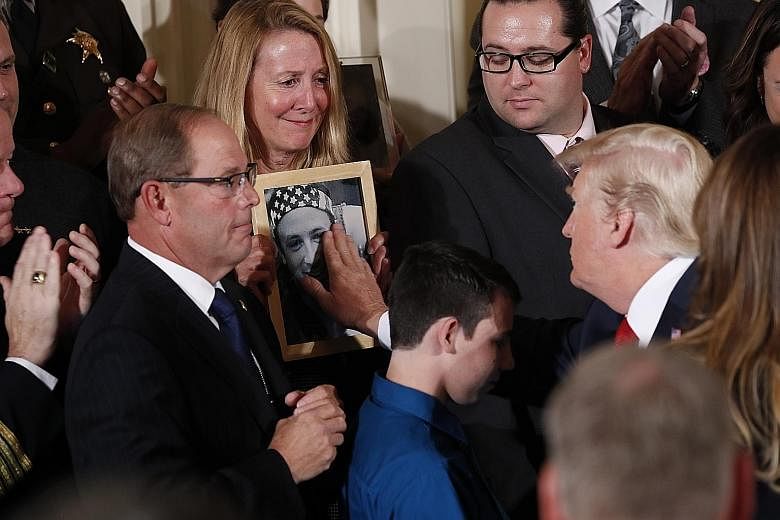WASHINGTON • US President Donald Trump has declared the opioid crisis a public health emergency, stopping short of the national emergency declaration he promised months ago that would have freed up more federal money.
Responding to a growing problem, particularly in rural areas, Mr Trump will redirect federal resources and loosen rules to combat opioid abuse, administration officials said. But it does not result in more money to combat the crisis.
Some critics, including Democratic lawmakers, said the declaration was meaningless without additional funding. But Republican lawmakers called the President's declaration an important step in combating the crisis.
"This epidemic is a national health emergency," Mr Trump said at the White House on Thursday. "As Americans, we cannot allow this to continue," adding that the epidemic was a "national shame" and "human tragedy". His wife, Melania, who said she had made fighting the epidemic one of her top priorities as First Lady, added: "This can happen to any of us."
The President also made a personal reference to addiction in his family by citing his deceased brother Fred, an alcoholic whose advice not to imbibe made an impression on Mr Trump, who does not drink alcohol.
The announcement disappointed some advocates and experts in the addiction fight, who said it was inadequate to fight a scourge that played a role in more than 33,000 deaths in 2015, according to the Centres for Disease Control and Prevention (CDC). The death rate has kept rising, estimates show.
Opioids, primarily prescription painkillers, heroin and fentanyl, are fuelling the drug overdoses. More than 100 Americans die daily from related overdoses, the CDC said.
A White House commission on the drug crisis had urged Mr Trump to declare a national emergency. On Wednesday, he told Fox Business Network he would do so.
Officials said funds that would have been released under a national emergency are already exhausted from recent storms that struck Puerto Rico, Texas and Florida. The administration would have to work with Congress to help provide extra funding, they added.
Under the declaration, treatment would be made more accessible for abusers, while ensuring fewer delays in staffing the health department to help states grapple with the crisis. Mr Trump said the government should focus on educating young people, "There is nothing desirable about drugs. They're bad."
Mr Trump also said he would discuss stopping the flow of fentanyl, a drug 50 to 100 times more powerful than morphine, with Chinese President Xi Jinping during his visit to Asia next month. He said the US Postal Service and Department of Homeland Security were "strengthening the inspection of packages coming into our country to hold back the flood of cheap and deadly fentanyl, a synthetic opioid manufactured in China".
In Beijing, Chinese Foreign Ministry spokesman Geng Shuang said China had always paid a great deal of attention to international cooperation against narcotics and had listed 23 components of fentanyl as controlled substances, despite not having a fentanyl abuse problem.
Meanwhile, the billionaire founder of Insys Therapeutics was arrested on Thursday on charges that he participated in a scheme to bribe doctors to prescribe a fentanyl-based cancer pain drug, marking a step by the authorities to fight the opioid epidemic.
John Kapoor, the majority shareholder who stepped down as chief executive of the company in January, was charged with engaging in conspiracies to commit racketeering, mail fraud and wire fraud in an indictment filed in a Boston federal court.
REUTERS

